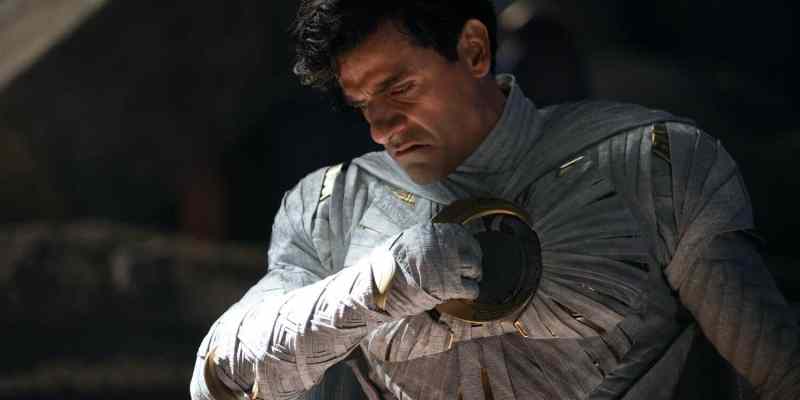This discussion and review contains spoilers for Moon Knight episode 6, “Gods and Monsters,” on Disney+.
In the end, Moon Knight held few surprises.
At points, “Gods and Monsters” often feels more like a checklist than an actual episode of television. It is a narrative that dutifully cycles through a familiar list of things that a show like this needs to do before crossing the finish line. It’s perhaps the most formulaic season finale of any of the Marvel streaming shows, hitting each of its beats with clockwork precision, paying out exactly what the audience expects when they expect it.
There is the obligatory gigantic computer-generated climax, as Arthur Harrow (Ethan Hawke) initiates the apocalypse. As is customary at the end of these stories, a supporting character gets to become a superhero teasing future adventures, as Layla (May Calamawy) becomes the avatar of Taweret (Antonia Salib). There are multiple computer-generated throwdowns between Ammit (Saba Mubarak) and Khonshu (F. Murray Abraham), with customary “we’re not so different” dialogue.
Even the episode’s surprises aren’t really surprises. As Marc and Steven (Oscar Isaac) flee through the desert, chased by a sandstorm, Taweret swings out of nowhere for a heroic cavalry moment to literally break the wave. The episode’s post-credits teaser confirms something that fans had speculated since the show was first announced and that the show had all but confirmed as early as “The Friendly Type,” that there was at least a third personality in that body: Jake Lockley.
To be fair, this isn’t necessarily a bad thing. As a rule, when these streaming shows take a sharp swerve in their final episodes, often to reveal a fan-favorite villain like Agatha Harkness (Kathryn Hahn) or Wilson Fisk (Vincent D’Onofrio), they tend to derail themselves. Loki went from being the most interesting and compelling of these streaming shows to a massive disappointment when it undercut its core themes and character arcs so its final episode could tease future story beats.

So there is perhaps something to be said for a show that delivers no more and no less than it promises the audience. Moon Knight is an astoundingly average piece of television, its quality trapped by a high floor and a low ceiling. It meets its expectations. Then again, it’s worth taking a breath and acknowledging that Moon Knight overlapped with shows like Better Call Saul, Barry, Shining Girls, Severance, Atlanta, and Tokyo Vice. Even Peacemaker demonstrated the potential of a superhero show on a much smaller budget. Is “good enough” really good enough?
After all, this is a show that wastes Ethan Hawke, one of the most interesting actors of his generation. Hawke’s filmography is filled with memorable turns in genre fare, including intense and committed performances in projects of variable quality, from Gattaca to Sinister to The Good Lord Bird. This year alone, Hawke is complementing work on Moon Knight with turns playing a Viking king in Robert Eggers’ The Northman and a child murderer in Scott Derrickson’s The Black Phone.
Understandably, Harrow isn’t really the focus of Moon Knight. The show is more interested in the relationship between Marc and Steven, to its credit. However, that’s still no excuse for the show’s failure to give Hawke any particularly compelling material across its six-episode runtime. The best that “Gods and Monsters” can think to do with Hawke is to have his eyes glow purple as he takes on the heroes in a two-(or even four-)-on-one fist fight.
It feels appropriate that Moon Knight has been so obsessed with the idea of a balanced scale. After all, that is the entirety of Harrow’s supervillain schtick, and it was a major plot point on Marc and Steven’s journey to the underworld in “Asylum.” The show is very carefully and very meticulously put together so as to avoid potentially tipping over in any given direction. Many of the show’s key creative choices feel like a calculated attempt to have the show’s cake and eat it.

This is most obvious with the relationship between Marc and Steven. “Asylum” worked hard to avoid making Marc’s treatment of Steven seem unsympathetic or antagonistic. Marc didn’t manifest Steven to take the abuse that he couldn’t; he manifested Steven as an innocent side of himself to protect from such abuse. Similarly, Marc’s abusive backstory served to largely absolve him of violence, with the show never seeming too concerned with the souls of the people he killed.
Because Moon Knight worked so hard to avoid making Marc unlikeable or unsympathetic to audiences across the show’s weekly release model, the character’s choices in “Gods and Monsters” carry little dramatic weight. When Taweret offers Marc space in paradise on the condition that he abandon Steven to the cold empty desert, there is no tension. Moon Knight has already made it clear that Marc will do whatever it takes to protect Steven, so his refusal is a given.
“Gods and Monsters” treats the reunion of the characters as a big dramatic payoff, a conclusion to their character arc. However, it would feel more earned if the show hadn’t already spent several episodes softening Marc as a character. It’s clear that the show wants that moment of emotional catharsis between Marc and Steven, but it is unwilling to risk potentially alienating the audience to ensure that it has maximal impact.
This carries across the show’s resolution of the threat posed by Harrow and Ammit. At the end of their confrontation, Marc refuses to murder Harrow in service of Khonshu. To be fair, it is probably worth conceding that Khonshu maybe has a point here. It’s not like Marc is murdering a pickpocket or a jaywalker without due process. Harrow was in the middle of initiating a global cataclysm that would have killed billions of people had it reached critical mass. His death might be justifiable.

Nevertheless, “Gods and Monsters” makes a big deal of Marc’s refusal to kill the incapacitated Harrow. It is a triumphant and heroic moment, one that dutifully completes Marc’s character arc, as he rejects Khonshu’s influence and makes a proactive choice about the man that he wants to be. Indeed, the fact that Harrow probably deserves to die adds weight to Marc’s choice. It matters. It is not an easy decision. It is theoretically possible for the viewer to disagree with Marc’s choice.
Naturally, Moon Knight decides to have the best of both worlds. “Gods and Monsters” features a post-credits sequence in which Marc’s alternate personality Jake abducts Harrow from a hospital and shoots him repeatedly in the back of a limousine. Much like the attempt to capitalize on the emotional catharsis of Marc and Steven reconciling without actually generating any tension, this narrative choice allows the audience the catharsis of Harrow’s death without bloodying Marc’s hand.
It is a narrative cheat, and it dramatically undercuts a lot of Moon Knight. “Gods and Monsters” essentially ends Moon Knight close to where it started in “The Goldfish Problem.” In “The Goldfish Problem,” Steven was confronted with a hidden murderous alternate self who worked at the behest of the Egyptian deity Khonshu. In “Gods and Monsters,” Steven and Marc are confronted with another hidden murderous alternate self who works at the behest of the Egyptian deity Khonshu.
In some ways, Moon Knight feels like a six-episode treadmill. It’s basically functional and works to specification, but it runs in place and it doesn’t go anywhere interesting. Given the potential of the character, the cast, and the concept, that feels disappointing.
